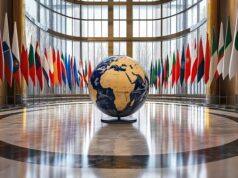Syria emerges as the first Al Qaeda nation

The fall of Bashar al-Assad’s regime in Syria was initially met with celebration, marking the end of a 53-year chapter of oppression.
However, as the dust settles, the rise of Abu Mohammed al-Golani and his Al Qaeda-linked Hayat Tahrir al-Sham (HTS) forces signals the start of a new and deeply troubling era.
Could Syria now face the unprecedented reality of becoming the world’s first Al Qaeda nation?Syria now faces a new and alarming reality: the ascent of rebel leader Abu Mohammed al-Golani, a prominent member of Al Qaeda.
This shift risks plunging Syria from the frying pan into the fire, as it may become the world’s first Al Qaeda nation.
Despite al-Golani’s promises of forming an inclusive government that treats all citizens equally under the law, many fear his rule will ultimately oppress minorities, women, and non-Muslims under the strict codes of political Islam.
The initial jubilation among Syrians following Assad’s departure reflects a common sentiment in the Arab world, but analysts warn that this celebration may be short-lived.
Al-Golani’s leadership is likely to marginalize Shias, Christians, and other minorities, turning them into second-class citizens.
Additionally, women’s rights may face severe curtailment under the implementation of Sharia law, a hallmark of Al Qaeda governance.
The Islamist takeover in Syria bears notable differences from events in Bangladesh earlier this year. In Syria, rebel leaders have emphasized preserving state institutions, restoring essential services, and reopening banks to ensure economic stability.
They have also instructed their followers to protect cultural and religious sites, including those of the pro-Assad Alawites, to foster inclusivity in the transitional process.
In stark contrast, in Bangladesh, figures like Trump-critic Muhammad Yunus have allegedly encouraged acts of vandalism, arson, and mob violence, labeling such actions as “celebrations”.
Signs of external influence in Syria’s regime change are evident. For instance, Hadi al-Bahra, president of the Syrian National Coalition, has outlined plans for an 18-month transitional period, promising to draft a new constitution and hold elections.
Syrian UN ambassador Koussay Aldahhak has pledged accountability for military officers involved in torture and committed to establishing a state based on freedom, equality, and democracy.
However, these promises seem at odds with Al Qaeda’s ideology, which views democracy as “laws of Satan” and rejects gender equality as “enemy propaganda”.
Disturbing revelations about key figures in al-Golani’s team have emerged. Norway-based counterterrorism journal Nordic Monitor reported on Emrah Çelik, a Turkish Islamist militant and former official in the youth branch of Turkey’s ruling Justice and Development Party (AKP).
Çelik, who once appeared in a video holding a severed head, recently entered the Syrian city of Latakia with a jihadist group.
A video posted on social media showed Çelik leading militants into the city, accompanied by captions celebrating their arrival.
Çelik’s background reveals a troubling connection to the AKP. He served as deputy chairman of the party’s youth branch in northwestern Turkey before joining jihadist groups in northern Syria in 2015.
Çelik’s group, the 2nd Coastal Division, operates in the Turkmen mountains and has gained notoriety for its brutality, including the killing of a Russian fighter pilot in 2015. Despite these actions, records from Turkey’s Supreme Court of Appeals show Çelik remains a registered member of the AKP.
Meanwhile, Turkey’s ruling party has begun to rally behind President Recep Tayyip Erdogan, framing the Assad regime’s fall as a strategic success.
Islamist family foundations linked to Erdogan, such as the government-funded Turkey Youth Foundation (TÜGVA), have launched propaganda campaigns celebrating the regime change.
These narratives target youth and often carry subliminal references to dismantling Turkey’s secular foundations, as evidenced by the imagery of destroyed statues reminiscent of Mustafa Kemal Atatürk’s legacy.
The ideological roots of Hayat Tahrir al-Sham (HTS), al-Golani’s organization, have raised concerns. Al-Golani, once affiliated with Al Qaeda, has sought to distance himself from extremism, pledging pluralism, ethnic equality, and religious tolerance.
Yet, skepticism abounds about whether these promises will hold or if the group will revert to its extremist roots once power is consolidated.
The geopolitical implications of Syria’s transformation are profound. Regional powers like Turkey, Iran, and Russia have vested interests in Syria’s future, and the new leadership’s actions will influence these dynamics.
For now, the international community – particularly the United States and Israel—must navigate this precarious situation carefully.
The Biden administration faces a critical decision: whether to remove HTS from the terrorist list to signal trust in Syria’s new leadership.
Conditional diplomatic recognition could serve as leverage, incentivizing the rebels to adhere to their commitments to democracy and the rule of law.Israel, meanwhile, has established three “red lines” for the new Syrian government: preventing chemical weapons from falling into jihadist hands, blocking Iranian troop deployments to Syrian military installations, and prohibiting hostile forces near the Israeli border.
To enforce these boundaries, Israel has taken proactive measures, including seizing control of buffer zones in the Golan Heights and bombing suspected chemical weapons sites.
These actions underscore the need for vigilance, as jihadist groups like HTS cannot be trusted to honor their promises indefinitely.
The fall of Assad marks a pivotal moment in Syria’s history, but the path forward is fraught with uncertainty.
Despite al-Golani’s reassurances, the potential for Syria to become a hub for extremist activity remains high. If HTS consolidates power, it could launch broader campaigns targeting regional stability, including plans to “liberate” Jerusalem, Medina, and Mecca.
The international community must remain vigilant, holding Syria’s new leadership accountable to their promises of inclusivity, democracy, and the rule of law.
While the overthrow of Assad’s regime may bring hope for change, it also serves as a stark reminder of the dangers posed by extremist ideologies.
Ultimately, Syria’s future hinges on the ability of its leaders to navigate the complex web of domestic and international pressures while resisting the lure of radicalism.
The stakes could not be higher – for Syria, the region, and the world.Syria stands at a crossroads, its future teetering between hope and the shadow of extremism.
The fall of Assad is a pivotal moment, but the ascent of Al Qaeda-linked leadership raises urgent questions about the nation’s trajectory.
The international community must act decisively to ensure that promises of inclusivity and democracy are not eclipsed by the resurgence of radical ideologies.
The stakes extend far beyond Syria, impacting regional stability and global security. How this chapter unfolds will shape not only Syria’s destiny but also the broader fight against extremism worldwide.




